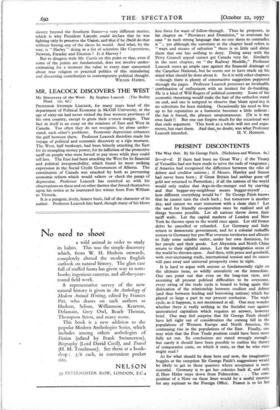MR. LEACOCK DISCOVERS THE WEST
PROFESSOR STEPHEN LEACOCK, for many years head of the department of Political Economy in McGill University, at the age of sixty-six had never visited the four western provinces of his own country, except to graze their estern margin. That fact in itself is an essay on the relations of East and West in Canada. Too often they do not recognise, let alone under- stand, each other's problems. Economic depression enhances the gulf between them. Professor Leacock therefore made his voyage of political and economic discovery at a ripe moment. The West, half bankrupt, had been bitterly attacking the East for its strangling money power, for its infliction of the protective tariff on people who were forced to pay more while they could sell less. The East had been attacking the West for its financial and political irresponsibility, which found its most striking expression in the Social Credit Government of Alberta. The constitution of Canada was attacked by both as preventing economic reform which would relieve or check the pangs of depression. Professor Leacock has enriched us with his observations on these and on other themes that forced themselves upon his notice as he journeyed last winter from Fort William to Victoria.
It is a pungent, lively, honest book, full of the character of its author. Professor Leacock hits hard, though many of his blows lose force for want of follow-through. Thus he proposes, in his chapter on " Provinces and Dominion," to overstate his case "in Such strong language that no one dares to contradict it " ; yet although the summary at the chapter head refers to " ways and means of salvation " there is so little said about them that one has nothing to deny. Doing away with the Privy Council appeal cannot get Canada very far. Similarly in the next chapter, on " the Railway Muddle," Professor Leacock states an ample case against the financial drainage of the Canadian National, but he seems not to have made up his mind what should be done about it. So it is with other chapters —though there is plenty of constructive suggestion peppered through the pages. Professor Leacock possesses an invaluable combination of enthusiasm with an instinct for de-bunking. He is a kind of Will Rogers of political economy. Some of his economic theorising would make the hair of the orthodox stand on end, and one is tempted to observe that blunt spear in; is no substitute for keen thinking. Occasionally his need to live up to his reputation as a humorist becomes a little tedious : the fun is forced, the phrases unspontaneous. (Or is it my own fault ?) But one can forgive much for the occasional mot that ends argument. This book as a whole will not end argu- ments, but start them. And that, no doubt, was what Professor






























































 Previous page
Previous page